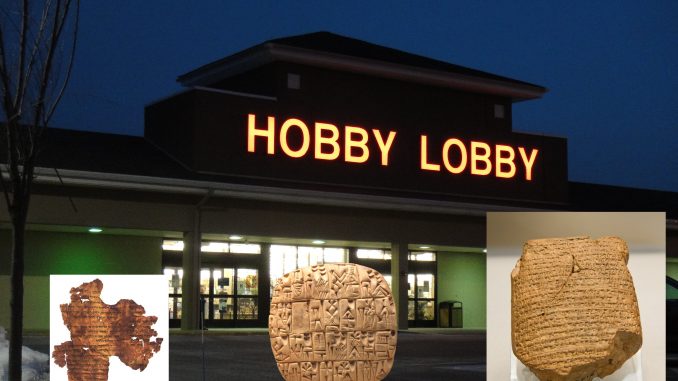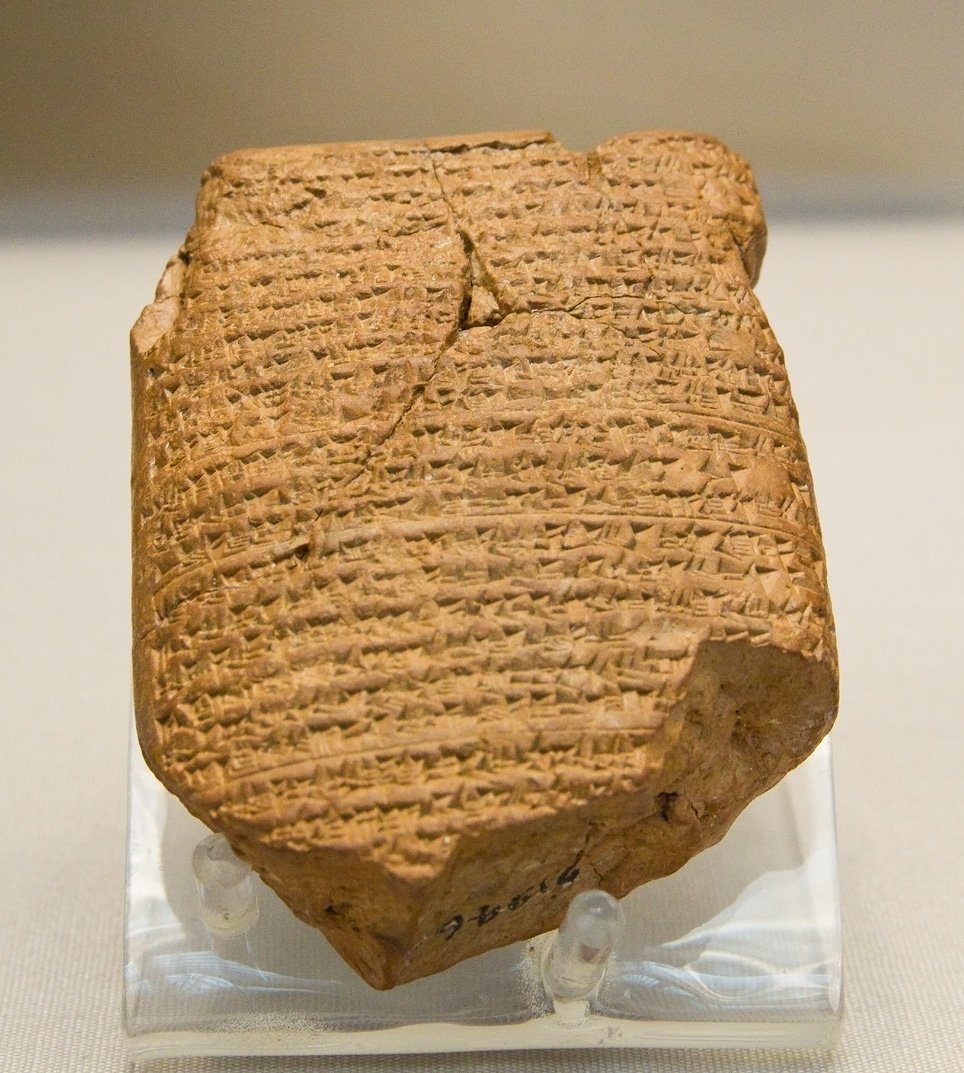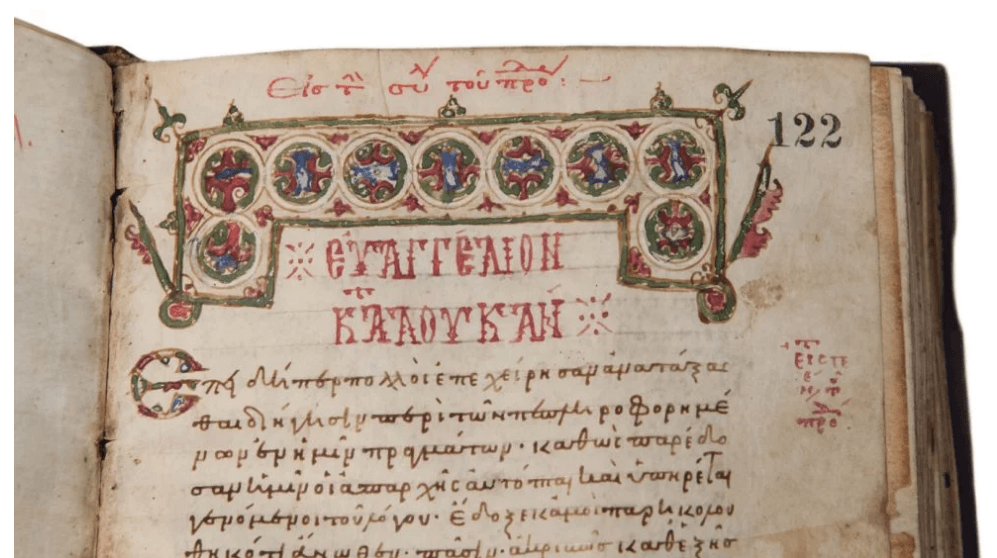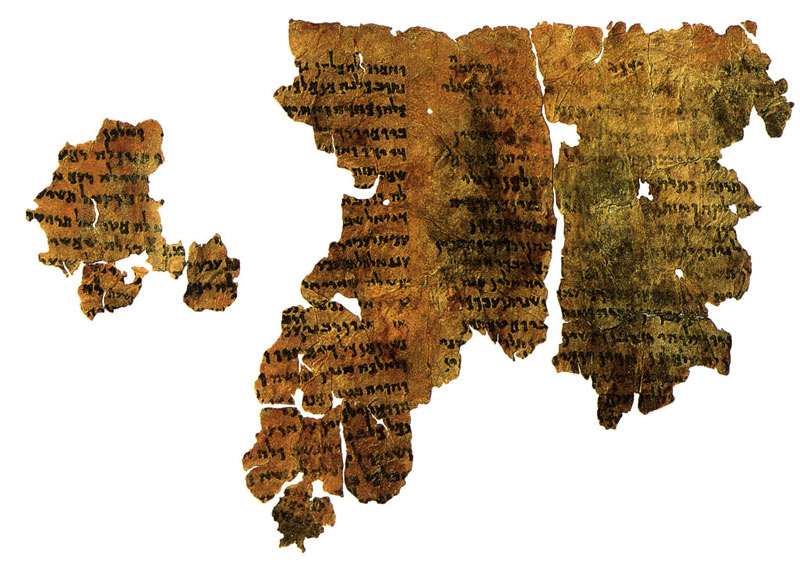
Hobby Lobby president, Steve Green, who is also the chairman of the Museum of the Bible, began buying up antiquities related to the bible between 2009 and 2011. Since that time, he and his museum have suffered a few setbacks which include having to return stolen and illegally purchased antiquities to their country of origin, giving a donated manuscript of the four gospels back tot he university it was stolen from, and—now—removing its fragments of the Dead Sea Scrolls from display because they’re fraudulent.
More than one person pointed out that Hobby Lobby and the Greens were buying antiquities too fast. Too fast to verify their provenance; too fast to know if they’re being conned.
And boy were they.
Hobby Lobby Background
The Green Family of Oklahoma—David, his wife Barbara, and two children, Steve and Mart—began the Hobby Lobby chain of stores in the 1970s. In the beginning, they assembled and sold small picture frames. They took advantage of the “hippie obsession with beads” and ultimately ended up with a chain of hobby and craft stores in nearly every state in the U.S. worth over $4.5 billion by 2012.
And they were deeply religious every step of the way. Store profits are used to proselytize in every town that has a Hobby Lobby. Stores are closed on Sundays. But they’re also bigots. Jewish customers are not catered to when it comes to holiday decorations and a store employee once told a customer, “we don’t cater to you people,” when asked about Hannukah decorations.
This is the culture the Greens created. Employees signed agreements that they would not sue Hobby Lobby when hired. Not even for the most egregious of ethical violations: sexual harassment, gender discrimination, or refusing to accommodate those with disabilities.
In 2010, it was Hobby Lobby that was responsible for the lawsuit against the United States over a part of the Affordable Care Act that provided for birth control. The Greens, with David’s son, Steve, now as their president, was suddenly in the public spotlight with their religious ideals.
Recipe for a Museum: First, Some Stolen Tablets
In 2009, the Greens started amassing a collection of biblical manuscripts. Between 2010 and 2011, they spent millions on artifacts and antiquities from the Middle East. Their purchases were apparently so rushed that they never took the time to verify provenance or authenticity. Or, as some speculate, they simply didn’t care. Perhaps they felt it was their religious right—a God-given right—to obtain any item they felt supported their religious views. Perhaps the laws of man were not of importance to the Greens.

The Museum of the Bible spans at least 430,000 square feet in Washington D.C. and opened in November of 2017 amid a scandal of stolen antiquities. U.S. Immigration and Customs Enforcement seized thousands of artifacts (at least 5,500) from Iraq, including clay tablets and bullae (hollow, clay envelopes that contain tokens, probably used for accounting in trade). Each and every one of these was stolen from Iraq and purchased by Steve Green and Hobby Lobby.
Smugglers for Hobby Lobby listed antiquities on customs forms as “ceramic tiles,” estimating value at pennies compared to what was actually being paid.

Green apologized after the seizure and being ordered to pay a $3 million fine for illegally importing artifacts (the items were returned to Iraq) and claimed he was ignorant of how to deal in antiquities. That was his defense. They understood enough not to put “priceless clay tablet of Uruk” or “million dollar Sumerian artifact” on the customs form.
A Pinch of Stolen Religious Manuscripts
Just a year after the 2017 antiquities scandal and seizure, Hobby Lobby is returning an overdue library book: a New Testament manuscript purchased at auction with Sotheby’s before ending up with Steve Green. To their credit, the Greens and Hobby Lobby returned it without being told to, but with so many items on display, it’s a matter of time before someone recognizes something like “Manuscript 18,” which was removed from the library of the University of Athens in Greece in 1991.

The manuscript remained on display at Hobby Lobby’s museum for a short period after it’s questionable provenance was discovered and shipped back to Athens on October 1, 2018.
Add a Dash of Fraudulent Archaeology
Back in November of 2017, CNN pointed out that the fragments of the Dead Sea Scrolls that Steve Green so proudly had on display were of questionable authenticity.
Just today, The Independent is writing that the Hobby Lobby museum is pulling the fragments from display. They’re fakes.
The Dead Sea Scrolls are ancient Hebrew manuscripts that were found the Qumran Caves of the West Bank in Israel—near the Dead Sea, hence their name. Mostly in tiny fragments, these bits of parchment are the remnants of much larger scrolls that have just barely survived since they were written between the 8th century BCE and the 11th century CE. They’re considered the second oldest surviving works of biblical literature the Jewish religion and, thus, important for Christian Bible scholars.
Since about 2002, collectors have paid millions of dollars for these tiny fragments of text, all in hopes of owning something uniquely related to biblical history. But Dr. Kipp Davis warns, “There is a growing emerging consensus among Dead Sea Scroll scholars that many of the fragments in the private collections are fakes,” and he stated in his article, “Caves of Dispute,” that at least 6 of the fragments belonging to Hobby Lobby and on display were fake. That was in 2017.
So Green and Hobby Lobby sent some fragments off for testing to experts who said these things “show characteristics inconsistent with ancient origin.” Jeffrey Kloha, the Museum of the Bible’s chief curator said:
“Though we had hoped the testing would render different results, this is an opportunity to educate the public on the importance of verifying the authenticity of rare biblical artefacts, the elaborate testing process undertaken and our commitment to transparency. As an educational institution entrusted with cultural heritage, the museum upholds and adheres to all museum and ethical guidelines on collection care, research and display.”
In all fairness, the Greens and the museum they run along with Hobby Lobby, voluntarily pulled these fragments after sending them off for testing. But the questions were already raised about their authenticity. Much like Manuscript 18, it seems to me that it was a matter of when—not if—they were to be noticed. Additional DSS fragments may also be fake and, given the rapid nature of Green’s acquisition of goods, there’s no telling how many more fake, fraudulent, or stolen artifacts might emerge over time.
The Greens and Hobby Lobby, no doubt, see themselves as in the right. Whether it’s about pushing their religious agenda on employees, restricting their abilities to litigate unfair and unethical workplace conditions, or allowing theft, fraud, and even the funding of terrorism (that’s where the illicit funds for antiquities goes, my friends). I agree that Hobby Lobby is a private company and the Greens are free to run it and their museum how they see fit, but there are ethical lines that they’ve crossed. In spite of Green’s insistence that he was ignorant.
And, yes… I shop at Michael’s.
Sources and Further Reading
Moss, Candida and Joel Baden (2017). Bible Nation: The United States of Hobby Lobby. Princeton University Press
Mystery at the new Bible museum: Are its Dead Sea Scrolls fake?
Hobby Lobby, which smuggled antiquities for Bible Museum, will return the artifacts to Iraq
World famous Dead Sea Scrolls at Museum of the Bible ‘are fake’
Museum of the Bible returns medieval manuscript after discovering item’s theft


Leave a Reply
You must be logged in to post a comment.